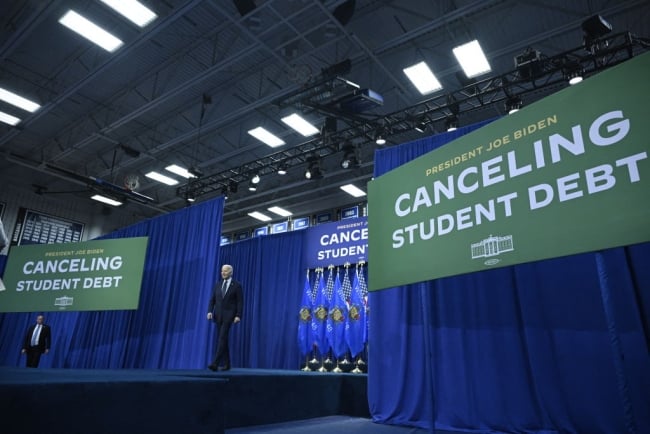You have /5 articles left.
Sign up for a free account or log in.

The Supreme Court refused Wednesday to overturn an appeals court order that’s blocked the Biden administration’s latest effort to make student loan payments more affordable.
Andrew Caballero-Reynolds/AFP via Getty Images
The Biden administration’s new loan-repayment plan remains on hold this week after the U.S. Supreme Court declined to lift an injunction blocking the plan.
On Wednesday, Justice Brett Kavanaugh also declined to take up a lawsuit from seven Republican-led states challenging the plan known as Saving on a Valuable Education. Last week’s order from the U.S. Court of Appeals for the Eighth Circuit nullified a separate appeals court decision that had allowed SAVE to move forward. It’s all left borrowers reeling.
The decision means that payments will remain paused for more than eight million borrowers as the court battle over SAVE continues. The plan, which launched last year, offers borrowers lower payments and a quicker pathway to loan forgiveness, among other benefits. Before federal judges intervened, the Education Department had forgiven more than $5 billion in loans for 414,000 borrowers under SAVE.
Borrowers who want to enroll in SAVE can fill out a PDF application, but the department has turned off the online form. Loan servicers have temporarily paused their processing of SAVE applications, the department has said.
Balking at the program’s cost and its loan-forgiveness provisions, Missouri and six other Republican-led states sued the Biden administration in the spring over the plan. They argued in part that the plan exceeded the department’s authority and was another version of the one the Supreme Court struck down last summer in Biden v. Nebraska. Additionally, the plan would harm the states’ bottom lines, they argued, and lead to lost revenue for the Higher Education Loan Authority of the State of Missouri (MOHELA), a state-created entity and federal loan servicer.
The Eighth Circuit found earlier this month that the states were likely to succeed in their lawsuit and granted their request for a national injunction. “The new SAVE plan, by contrast, is an order of magnitude broader than anything that has come before,” the judges wrote, noting that previous versions of income-driven repayment plans “were relatively uncontroversial.”
The Biden administration appealed that decision to the Supreme Court, arguing that the appeals court “fundamentally erred” in issuing a nationwide injunction that has caused “significant and irreparable harm to borrowers.”
Temporary injunctions are supposed to preserve the status quo while the courts consider the merits of a case. Eighth Circuit judges said the injunction wouldn’t disrupt the status quo for borrowers despite the fact that many provisions of SAVE have been in place since last fall. (Payments for affected borrowers had already been paused due to an earlier order from the court.)
If the justices wouldn’t overturn the order, Solicitor General Elizabeth Prelogar requested that they take up the case and hear oral arguments in November—a request the court also denied.
Opponents of debt relief applauded the decision.
"We’re happy to see the Supreme Court allow the Eighth Circuit’s injunction to continue against the unlawful SAVE loan-cancellation plan,” said Sheng Li, litigation counsel for the New Civil Liberties Alliance, a conservative nonprofit that urged the Supreme Court to deny the administration’s request. “There was no basis to lift the injunction because the Department of Education’s newest loan-cancellation program is just as unlawful as the one the Court struck down a year ago in Biden v. Nebraska.”
Representative Virginia Foxx, the North Carolina Republican who chairs the House education committee, said in a statement that the Biden administration should “quit trying to force SAVE through.”
“I don’t know how many times the Biden-Harris administration needs to hear this before the message sinks in: Its student loan schemes are illegal,” Foxx said.
Kavanaugh didn’t explain his decision but wrote that he expects the Eighth Circuit to render its decision on the lawsuit “with appropriate dispatch.” At that point, the Biden administration can appeal again to the Supreme Court.
Consumer-protection and debt-relief advocates have sharply criticized the injunction in recent weeks.
“Borrowers have relied for decades on the stability and security of [income-driven repayment] plans like SAVE to help pay back their loans at affordable and predictable rates,” the Student Borrower Protection Center wrote in an amicus brief filed this week with the Eighth Circuit. “That was the status quo before the states filed this action. The injunctions in this matter have unnecessarily sown chaos in the system, threatening the financial well-being of millions of borrowers.”
Kristin McGuire, executive director at Young Invincibles, an advocacy group focused on issues impacting young adults in higher education and other policy areas, said in a statement that the Supreme Court made “a grave and unjust mistake” Wednesday.
“It is outraging that politics continue to be put above the well-being of borrowers and their financial livelihood,” McGuire said. “The SAVE plan is a legal and just form of student debt cancellation and these politically charged battles should not prevent borrowers from the deeply needed reprieve they need.”
The lawsuit in the Eighth Circuit is one of the two lawsuits from Republican-led states challenging the plan. In the other, led by Alaska, the U.S. Court of Appeals for the 10th Circuit ruled differently, saying the Biden administration could move forward with implementing the SAVE plan. Last week, in light of the Eighth Circuit decision, the 10th Circuit stopped its review of the lawsuit because the ruling was nationwide.
“That is not how the judicial process is supposed to work,” Prelogar wrote in a filing to the Supreme Court. “One circuit should not be able to inhibit the development of ‘thoughtful precedent at the circuit level’ by issuing an injunction with universal reach in circumstances where more tailored relief would fully redress the plaintiffs’ asserted injury.”




